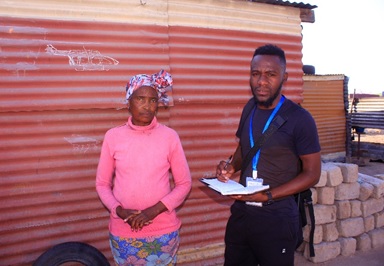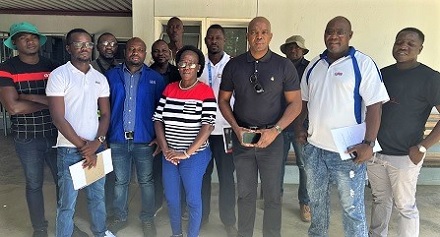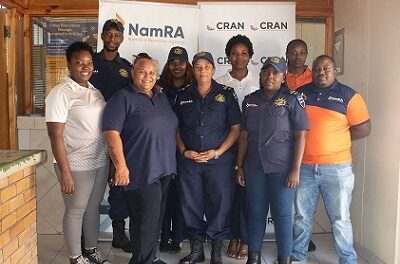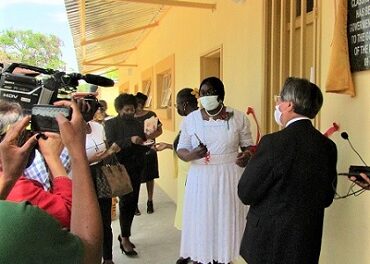
By Shivute Kaapanda /
At the town of Outapi in northern Namibia, Shack R-203 at Okaye-kOngwe informal settlement, is the home of Meme Lahja Shilongo, a 61-year-old former police officer.
Mrs Shilongo has lived in this five-bedroom shack without electricity since 2012 when Okaye-kOngwe informal settlement was newly established.
Originally from Epoko lyaKanyenye village in Omusati Region, Okalongo Constituency, Shilongo shares her 5-bedroom shack with other eleven occupants who are close family members: six young adults, and five kids who walk daily to nearby schools over distances of about three kilometres in search of a better life.
Okaye-kOngwe is one of the seven informal settlements of Outapi; the others being Onhimbu location, Tobias Hainyeko location, Okakwa kaNakale location, Okalonda, Okasikili and Oukwa waNanyanga.
At the time of the visit by Omutumwa no one in Shilongo’s household has ever secured formal employment – other than herself when she was a police officer. The survival of this family solely depends on her old age pension.
This is quite an ordinary family, living in an urban environment. There is municipal water available in the shack yard and a flushing toilet; but they depend on firewood, plastics, paraffin and gas to cook breakfast, lunch and dinner every day.
Two young male adults of the household go to Nakayale Vocational Training Centre which is about four kilometres away from the shack. Their hope is to acquire some useful skills which could in future make them earn a living.
As the head of the household, some of the daily means of survival Shilongo engages in is selling firewood and bottled alcohol to pay municipal water bills and rent to sustain their lives.
They rely on Mahangu porridge as a staple food; they import the Mahangu grains from the village field which they cultivate and harvest every year for subsistence means.
“It has been a struggle living in a shack for over 12 years,” Shilongo narrates. “This is not the kind of life I dreamed of when I was younger, I dreamed of owning a house for myself. And I still have the dream, that I will have a house for my kids one day in future so that they can live a decent life here before I retire to the village soon.”
The land they are dwelling on is a municipal land which they are only renting, hence R-203. The “R” represents “rent”.
“I once applied for land for housing when I was in public service but I did not manage to get one until I retired,” she stresses. “The living condition here is very tough.”
Shilongo stresses that living in a shack is a challenge of its own, “but more challenging is the struggle everyday to find what to eat for my kids and grandkids.”
She says that she is aware that the town council through the constituency office and the Office of the Prime Minister recently embarked on a drought relief program in informal settlements where shack dwellers get maize flour, tinned fish and soup, and this has since given some shack dwellers a relief in terms of having food at home.
“But me and my household are yet to receive any drought relief up until today,” she says. “I am patiently waiting for the day I will receive the drought relief food at my shack here.”
Meme Leena Uupindi who resides in Tobias Hainyeko location since 2010 but originally from Omatelekelo village in Outapi Constituency owns a shack too, (R-261). She is a 38 years old unemployed single mother who lives in a two-bedroom shack with other four occupants including two little children who go to a local kindergarten just opposite her shack.
Her shack has no water, and no electricity available ever since she has lived here. The family relies on Mahangu grains from the village house for daily meals, and they struggle to buy relish as no one is permanently employed. Her daily job is to sell traditional liquor (Epwaka and Otombo).
“The conditions here are so tough for us and especially for our kids who came to live here for educational purposes,” she narrates.
“The municipality wants us to move away from here soon so that they can apparently develop the area,” she continues.
Other than the situation of lack of food for these shack dwelling residents, the general situation of sanitation is also not good. Most people have been relieving themselves in the bushes nearby when nature calls.
The municipality has recently put up several public toilets but they cannot cater for all the residents living in the settlement since several of the toilets are in disuse.
“Many of us only relieve ourselves in the open space near the location and at night we use basins as it is risky to go outside,” Uupindi laments.
“I want to have a plot and a house of my own in future once I save up some money,” she states. “I have never applied for a plot before as I cannot afford to buy a plot.”
For Eliakim Hishivibwa Nelundu, a 32 years old youth who owns a shack in Onhimbu location and lives alone, the economic and social conditions in the informal settlement is quite challenging. As a graduate in welding and metal fabrication he struggles to get a formal job and he only survives by building shacks for people in the settlement and in the villages.
Nelundu lives on a rented plot which belongs to the town council, no electricity is available and the municipality’s running water tap is 300 metres away from his shack.
“Sanitation is quite a problem here, sometimes I go to have a shower at municipal showers 500 metres away from my shack and use that ablution facility during the day,” he says. “We want water and electricity in our shacks.”
The Mayor of Outapi, Her Worship Selma Asino Shaumbako, says that her council is aware of the plight and dire economic and social condition of people living in the shacks particularly regarding their need for housing.
“Our town has embarked on a long term strategic plan (Outapi Town Strategic Plan 2022-2027) which focuses on five key areas such as Customer, Financial, Internal Business Processes, Learning and Growth, and Implementation,” Shaumbako explains.
“This strategic plan succeeds the previous council’s 2015-2020 strategic plan and focuses on the full development of Outapi town as a capital of Omusati region.”
Shaumbako also states that this “Strategic Plan” presents a strategic roadmap for the Outapi Town Council over the next five years which includes key elements pertaining to budgets for revenue and expenditure for services, and the infrastructure development strategic plan which includes the upgrading and infrastructural development of the town including all the informal settlements in the next five years from the year 2022-2027.
“Through the strategic plan in place the council is committed to improving the living conditions of our people and provide housing to the residents of Outapi of all income levels,” she states. “The council is committed to reducing the housing backlog in order to fast-track the housing needs of the residents of Outapi town.”
The Mayor also highlights the Phase 1 of the current construction of the water reticulation services at Extension 14 (Okakwa kaNakale location) as one of the infrastructural development taking place at this informal settlement.
“This development marks a significant step by the council towards enhancing community infrastructure and improving the quality of life for our residents.”
She adds that the construction of sewer reticulation (Oswin O. Namakalu Sanitation and Reuse facility) at Outapi Extension 12 in 2012 which included an ablution facility which consisted of flushing toilets and showers for males and females as well as laundry areas has catered for many residents of Outapi’s informal settlements of Okaye-kOngwe, Tobias Hainyeko and nearby locations which only costs a resident N$2 per entry. The money charged is used for maintenance of the facility.
Mr Natangwe Mumangeni, a member of the Outapi Town’s Management Committee, agrees with the Mayor and says that the council has the plight of its residents at heart.
“Due to insufficient government funding through the ministry of urban and rural development the council is unable to meet its obligations to full capacity regarding development, especially the upgrading of informal settlements,” he says.
While the leadership of the town of Outapi says that a new strategic plan is in place which is designed to get thousands of the town’s residents out of the shacks, for Meme Lahja Shilongo, and her household, life goes on in their R-203 shack home.

In the photo: Mrs Lahja Shilongo at her 5-bedroom shack at Okaye-kOngwe informal settlement in Outapi, also pictured with Shivute Kaapanda of Omutumwa News Online is Mr Eliakim Hishivibwa Nelundu at his shack house in Onhimbu at Outapi. (Photos by Tomas Josef.)

[NB. This article was produced with the financial support of the European Union. Its contents are the sole responsibility of Omutumwa and do not necessarily reflect the views of the European Union.]






